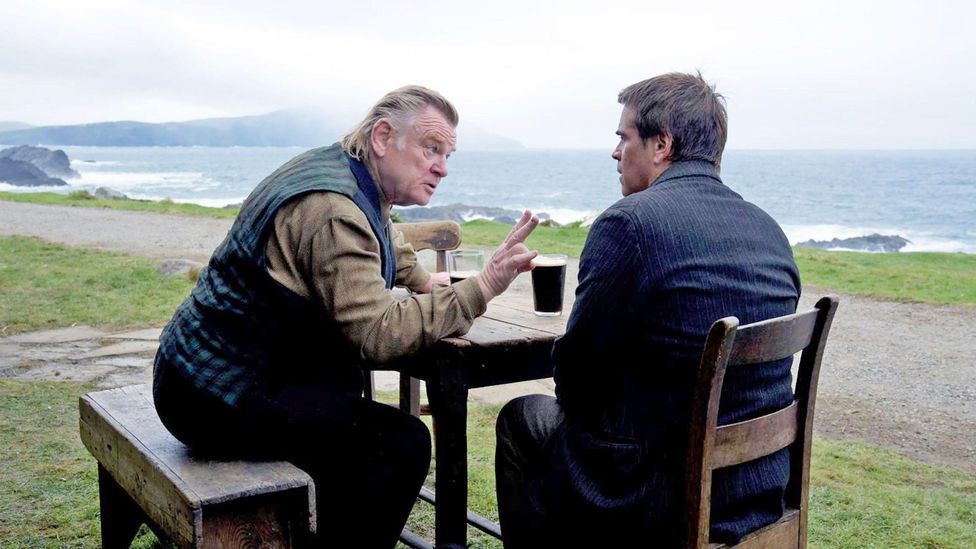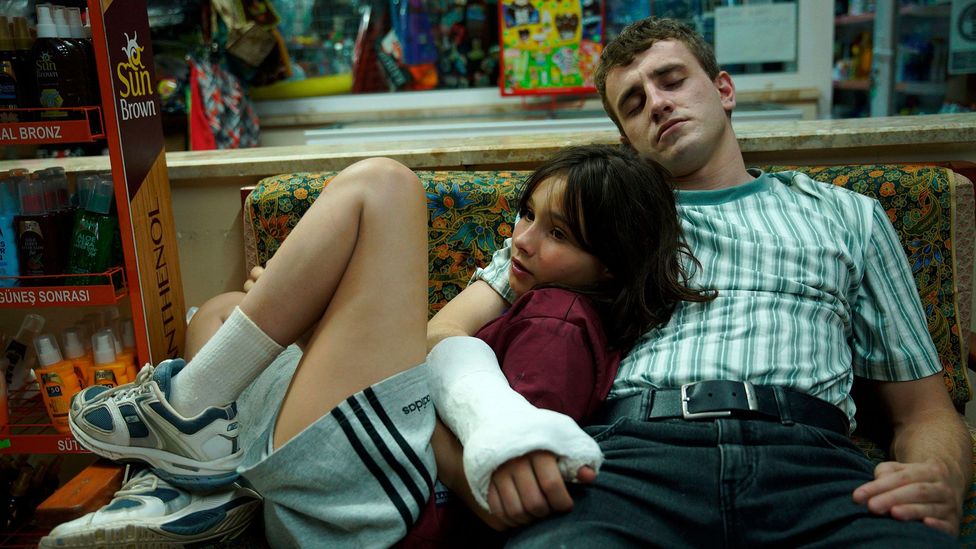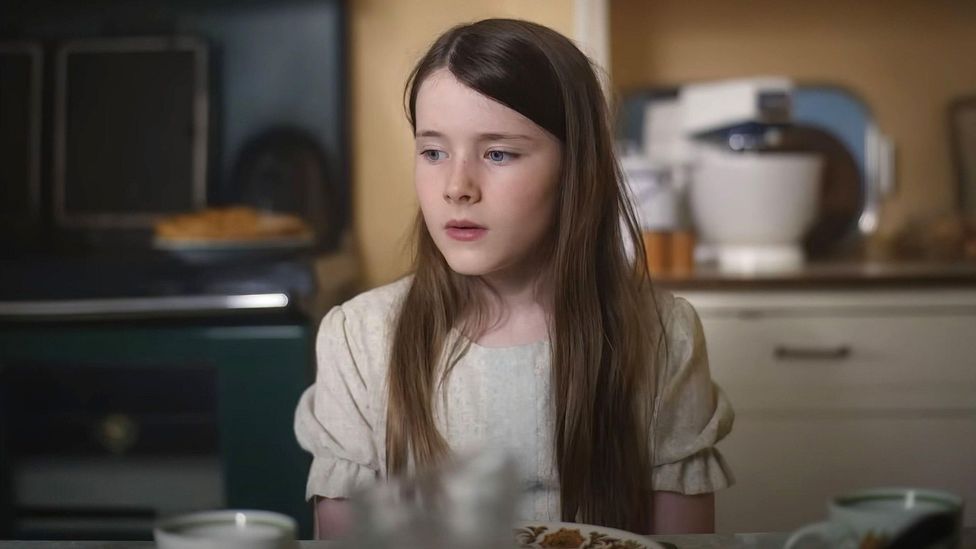Asked at the London Critics’ Circle Awards on what had made Irish film so successful this year, The Banshees of Inisherin director Martin McDonagh quipped, “I honestly don’t know. Brexit? Something in the water? Something.”
More like this:
– Will this WW1 film win best picture?
– Is the romcom truly back?
– The greatest monster movie ever made
What is true is that when the Oscars are held on 12 March in Los Angeles at the start of a week that includes St Patrick’s Day, the Irish contingent in Hollywood will be bigger than ever. Irish talent has 14 Oscar nominations, with the tragicomedy The Banshees of Inisherin taking nine, and County Kildare-born Paul Mescal garnering his first best actor nomination at the age of 26, for Aftersun, the debut feature film by Scottish director Charlotte Wells.
History has also been made with Colm Bairéad’s first feature film, An Cailín Ciúin or The Quiet Girl, which is nominated for best international feature film – the first ever movie in the Irish language to get an Oscar nomination. The Northern Irish short film An Irish Goodbye is also a contender for best live action short film.
After Irish talent won six British Bafta film awards recently, the famous “luck” of the Irish might hold in Hollywood too – although it’s less luck and more the culmination of years of strategy that’s led to this recognition.

The Banshees of Inisherin has been praised for its mixture of tragedy and comedy (Credit: Alamy)
McDonagh, who’s nominated for two Oscars, for best screenplay and best director, admits he’s been “surprised” by the level of success his film has enjoyed. Banshees overtook both Kenneth Branagh’s Belfast and the 1993 movie In the Name of the Father to become the most Oscar-nominated Irish film ever.
Starring Colin Farrell, Brendan Gleeson, Kerry Condon and Barry Keoghan, all of whom are nominated for Academy Awards, it’s a tragicomedy set on an Irish island, the story of a man who “breaks up” with his best friend.
“I’ve been surprised and humbled by the way it’s connected,” McDonagh tells the BBC. “It’s a sad story in a lot of ways, but I think both guys in there – the breaker-upper and the one who’s dumped – have connected with people, and somehow, I’ve been surprised by that. But it’s nice.
“In some ways it’s sad, but the story’s very funny, too. So I think that sweetens the pill in lots of ways.”
But actor Colin Farrell thinks the tone of the film touches a nerve, particularly after a difficult couple of years for many people. “Everything’s in there,” he tells the BBC. “Loneliness, community, the need for solitude, the need to be part of friendship, what happens to the broken heart when a friendship is dissolved. Faith, abuse, depression, despair, hope.”
Kerry Condon, nominated for best supporting actress for her part as a woman who leaves the small island to seek a better life for herself, tells the BBC that the film “raises a lot of things people thought about during Covid-19, maybe.
“It’s about the end of a friendship and the consequences for the people around them, but there’s also existential questions about what’s the purpose of life, is it important to be a good person or is it important to leave something behind?”

Paul Mescal received his nomination for his performance in Aftersun; every 2023 best actor contender is a first-time Oscar nominee (Credit: Alamy)
Following his Oscar nomination, Paul Mescal, who’s currently starring on stage in London in A Streetcar Named Desire, told The Hollywood Reporter that Ireland’s celebrated history of playwrights and authors, such as Samuel Beckett and Oscar Wilde, was significant for actors.
“I feel we’ve always overrepresented ourselves, just in terms of population, we’re punching above our weight,” he said.
“There’s a culture of writing in Ireland that I think somewhere along the way makes its way into the acting stuff. Because if you’re working with good writing, it forces you to step up… If the writing isn’t good, it doesn’t require a kind of engagement. Whereas I think working in the theatre has helped me with that.”
Irish writing gave Mescal his big break – in novelist Sally Rooney’s work Normal People, the story of an unlikely romance between two Irish teenagers, whose TV adaptation was a huge hit in 2020.
The actor delighted many fans in Ireland recently by speaking in Irish on the Bafta red carpet, and the recent investment in Irish language filmmaking has paid obvious dividends, according to An Cailín Ciúin’s director, Colm Bairéad.

An Cailín Ciúin is based on a 2010 New Yorker short story-turned-novella, Foster, by the Irish writer Claire Keegan (Credit: Alamy)
“Our success is one hundred percent down to the fact there’s been very specific and focused investment in Irish language cinema for the last few years; several organisations came together to create an initiative called Cine4, and the whole idea of the scheme was to develop and produce Irish language films. I guess to date our own film is the most successful example of that,” he tells the BBC.
Other Irish language hits that have enjoyed success include a thriller set during the Irish famine, Arracht (2019), and Foscadh (2021), based on a Donal Ryan novel, which were also put forward as Irish nominees for best international feature.
The Oscar nomination of An Cailín Ciúin has given the Irish language a greater cultural platform, as shown by Mescal speaking it at Bafta. “It’s a monumental thing for the Irish language community,” says Bairéad.
“Less than two percent of people in Ireland speak Irish on a daily basis, so when something like this happens, it’s of enormous importance in every sense. On a personal level for myself and other Irish speakers, but also on a political level. Because a language like ours, it needs government support, it needs investment, it needs belief. And projects like this and moments like this are invaluable in that regard.”
Louise Ryan from Screen Ireland, the development agency for the Irish screen industry, believes that Ireland’s current soft power is repayment for a consistency of investment in Irish creative talent.
“It’s testament to taking risks on new talent, but you’ve also got to have the infrastructure, investing in production crews and studios as well as writers and directors. We’ve set up five talent academies and we’ve had stable government support over the last few years, including a Basic Income for the Arts scheme. We’re really seeing the results of all that.
“An Cailín Ciúin is also based upon a novel from a debut author, while Martin McDonagh originally came from the theatre, so we’re seeing crossover in the arts; it’s not just from film, and it makes for a creative hub so you’re seeing talent coming through in all directions,” she tells the BBC.
Whatever happens to the Irish nominees on Oscar night, there’s a sense of a bigger picture “back home” in Ireland, according to best supporting actor nominee Barry Keoghan, who thanked Ireland generally in his acceptance speech when he won a Bafta last month.
“It encourages the arts at home, and we are an island of storytelling, great actors and poets and writers. And it helps the industry massively at home and encourages people to send the scripts in and go for what they want to do.”